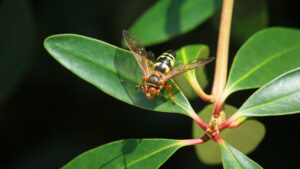The Cicada Killers of Georgia: Nature’s Skilled Predators

In the heart of Georgia’s summer, a fascinating and somewhat intimidating insect makes its appearance: the cicada killer wasp. Despite their daunting size and fearsome name, cicada killers are a unique and important part of the ecosystem. This article delves into the world of cicada killers in Georgia, exploring their behavior, life cycle, and ecological significance.
Cicada killers (Sphecius speciosus) are among the largest wasps in North America, with females reaching up to two inches in length. They are characterized by their black bodies with yellow markings, similar to those of a yellow jacket, but much larger and less aggressive towards humans. Males are smaller and do not have stingers.
Cicada killers have a fascinating life cycle closely tied to their namesake prey, cicadas. In late spring and early summer, female cicada killers emerge from their underground burrows, where they spent the winter as larvae. After mating, the females begin the hunt for cicadas.
The female cicada killer captures cicadas by stinging them, which paralyzes but does not kill them. She then carries the cicada back to her burrow, an impressive feat given that the cicada often weighs more than the wasp itself. In the burrow, she lays an egg on the cicada and seals it in a chamber. The egg hatches into a larva, which feeds on the paralyzed cicada, providing a fresh food source until the larva is ready to pupate.
The burrows are typically constructed in sandy or loose soil, often in sunny locations such as gardens, lawns, and along sidewalks. The female digs a series of tunnels and chambers, creating a complex underground nest.
While their large size and buzzing can be alarming, cicada killers are not aggressive towards humans and rarely sting unless handled roughly. Their ecological role is significant. By preying on cicadas, they help control cicada populations, which can become overwhelming and damaging to trees and shrubs during peak years. Additionally, cicada killers contribute to the aeration and turnover of soil through their burrowing activities.
In Georgia, where cicada killers are commonly found during the summer months, understanding and respecting these wasps is essential. Homeowners may notice the presence of cicada killers in their yards or gardens, especially if there are sandy areas suitable for nesting. While their presence might be unnerving, it is important to remember that they are not a threat to humans or pets. Simple precautions, such as avoiding disturbing their burrows, can help ensure peaceful coexistence.
Cicada killers are a remarkable part of Georgia’s natural landscape, playing a vital role in maintaining ecological balance. By controlling cicada populations and contributing to soil health, these wasps demonstrate the intricate and often underappreciated relationships within our ecosystems. As summer brings the hum of cicadas and the buzz of their killers, we are reminded of the fascinating complexities of nature right in our own backyards.
By:Tim
